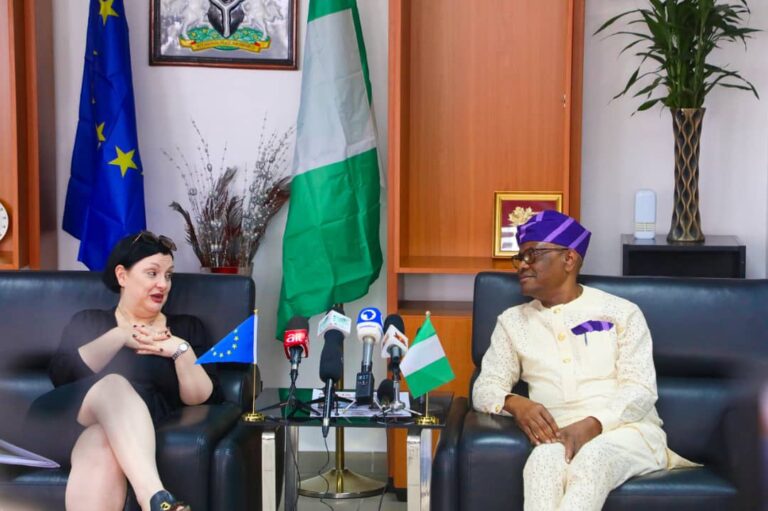Wike Seeks Collaboration with EU to Strengthen FCT’s Economy

Wike with EU Ambassador to Nigeria, Ms Samuela Isopi

By Reporter
The Minister of the Federal Capital Territory (FCT), Mr. Nyesom Wike, has sought the collaboration of the European Union, EU to strengthen the economy of the federal capital, Abuja.
According to the News Agency of Nigeria (NAN), Wike made the appeal when the EU Ambassador to Nigeria, Ms Samuela Isopi, visited him in his office in Abuja on Monday.
He said that the EU could partner with the FCT Administration in the areas of agriculture, tourism, and security.
According to the Minister, FCT was open for cooperation and investments in the aforementioned areas towards building a viable economy.
He stressed that an increased cooperation, and partnership with EU in agriculture, tourism and security will help to unlock the economic potentials of the FCT and create jobs for the teeming populace of the city.
Wike expressed optimism that the visit of the Ambassador would create something tangible that would impact on the lives of the residents of the city.
“Not just coming to tell me we are here to partner with you, we are here to work with you.
“It is good, but at the end of the day, the people will want to see what the achievements are, which for me, is a priority.
“You know that Abuja is one of the best cities in terms of available facilities. The landscape is beautiful, and it is a tourist and agricultural area.
“These are areas we can partner with you sincerely.
“Maybe, when we meet with the member countries, it becomes specific, which of these areas we can deal with, maybe agriculture, tourism, and security as the case may be,” the minister added.
He explained that, as part of the renewed hope agenda of President Bola Tinubu, the FCT Administration had submitted a proposal for the establishment of a Secretariat that would deal with women development issues.
This, he said, would ensure inclusion and promote the participation of women in governance.
Earlier, the EU Ambassador, said that the Union was refocusing its cooperation towards improving agricultural value chains and renewable energy.
This, according to her, would assist Nigeria’s economic diversification agenda. (NAN)








